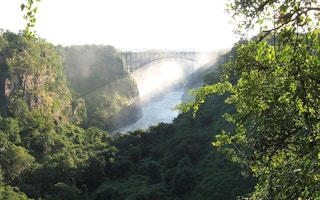Singapore-based media organisation Eco-Business took another step forward in its sustainability advocacy on September 8, when it attained a ‘Climate Neutral Company’ certification from Swiss-based emission reduction projects developer South Pole Carbon.
To continue reading, subscribe to Eco‑Business.
There's something for everyone. We offer a range of subscription plans.
- Access our stories and receive our Insights Weekly newsletter with the free EB Member plan.
- Unlock unlimited access to our content and archive with EB Circle.
- Publish your content with EB Premium.
As Asia Pacific’s leading sustainability news site, Eco-Business covers clean tech, smart city innovations, and sustainable development topics among others. Its carbon offsets—that is, a reduction in emissions of carbon dioxide made in order to compensate for an emission made elsewhere—will be used to support reforestation efforts in Zimbabwe.
Jessica Cheam, managing editor, Eco-Business, said: “Our mission is to educate and advocate on sustainable development, and we are fully behind the transition towards a clean, low-carbon society, so becoming carbon neutral was a natural step for us to take.”
The project offsets Eco-Business’ emissions from electricity use in 2016— which is 6.693 tonnes of carbon dioxide with Gold Standard Voluntary Emission Reductions (VERs).
Eco-Business’ offsets help fund the Kariba Avoided Deforestation Project in Zimbabwe, which has been torn apart by war, overpopulation and economic collapse over the past 20 years.
According to South Pole Carbon, these factors have caused communities to seek refuge in forests, and have been clearing trees to make space for farmland and as fuel for their homes. As a result, more than a third of Zimbabwe’s majestic forests have disappeared.
This project ensures that 785,000 hectares of forest and wildlife on the southern shores of Zimbabwe’s Lake Kariba are now being protected.
Cheam said that she had wanted the company to become carbon neutral much sooner, but as a young business, it faced some budget constraints and also found it difficult to obtain energy consumption data from the building owners of its offices.
“
Our mission is to educate and advocate on sustainable development, and we are fully behind the transition towards a clean, low-carbon society, so becoming carbon neutral was a natural step for us to take.
The crucial point came when it collaborated with Hong Kong-based sustainability platform provider Turnkey Solutions, which helped them monitor carbon emissions data.
-page-001.jpg?auto=format&dpr=2&fit=max&ixlib=django-1.2.0&q=45&w=340)
South Pole Carbon has certified Eco-Business as carbon neutral for last year’s energy consumption. By the end of 2017, Eco-Business also intends to offset the carbon footprint of its work-related travel. Image: Eco-Business
Eco-Business is not relying on offsetting alone, but is also looking at reducing its own impact to advance its sustainability goals, said Cheam.
“Eco-Business staff are all passionate about sustainability and all of them strive to live sustainably in all aspects of their lives, from eating no or less meat, to reducing energy usage and one-time use plastic. Every little gesture counts,” she added.
Eco-Business is now committed to remain carbon neutral. For 2017, it intends to add the carbon footprint of its business-related travel in addition to its direct emissions generated by energy consumption for the year.
It recently moved into a new co-working space in Ascent at Kent Ridge, Singapore, where it is curating a community called The SDG Collaborative focused on delivering the sustainable development goals.
Ascent is a Green Mark platinum office building, the highest rating given by the country’s Building and Construction Authority for green building performance.










